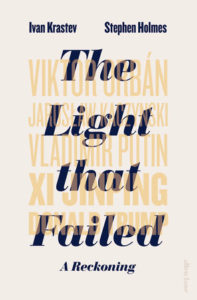Seeing democratization after the Cold War as a troubled process of political imitation helps us understand three critical ways in which an unjustifiable over-idealization of capitalism and democracy helped bring about the current wave of authoritarian and xenophobic anti-liberalism, according to Ivan Krastev, the chairman of the Center for Liberal Strategies, and Stephen Holmes, a professor of law at New York University:
- First, a crisis in the Western model itself — such as the financial shipwreck of 2008 — was bound to destabilize those countries in the West’s periphery that had committed themselves to copying Western-style liberal democracy. This explains why even countries that survived the Great Recession economically unscathed were politically destabilized by it….
 Radically restructuring a country’s political and economic system by imitating Western models had another pernicious, unanticipated effect. Imitation is necessarily an asymmetrical relationship between a superior model and its inferior imitators. Over time, this implicit moral hierarchy was bound to incubate feelings of humiliation, dispossession and resentment…..
Radically restructuring a country’s political and economic system by imitating Western models had another pernicious, unanticipated effect. Imitation is necessarily an asymmetrical relationship between a superior model and its inferior imitators. Over time, this implicit moral hierarchy was bound to incubate feelings of humiliation, dispossession and resentment…..- Third, the three-decade Age of Imitation that began in 1989 inflicted serious damage on liberal democracy in the West by putting to sleep the self-critical faculties of its leading politicians and political commentators. …. This uncritical idealization of the state of democracy at home was the direct result of the West’s preoccupation with democratizing others. It is not by accident that the National Endowment for Democracy (NED), a symbol of America’s commitment to democracy worldwide, has no mandate to work on problems within the United States. (Though this is also the reason it still enjoys bipartisan support.)…..
Democracies are not and cannot be “satisfaction machines,” the authors of “The Light That Failed: A Reckoning,” write for The New York Times.
“What democracies offer dissatisfied citizens is the right to do something about their dissatisfaction,” they add. “That is why a chastened democracy, having recovered from its unrealistic and self-defeating aspirations to global hegemony, remains the political idea most at home in the current age of dissatisfaction.” RTWT







